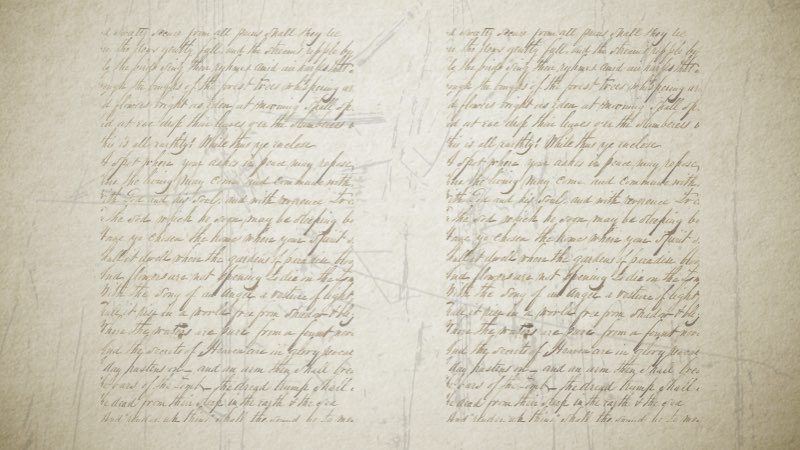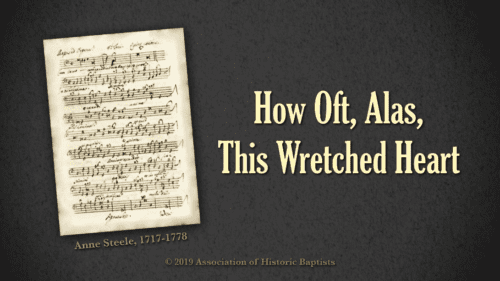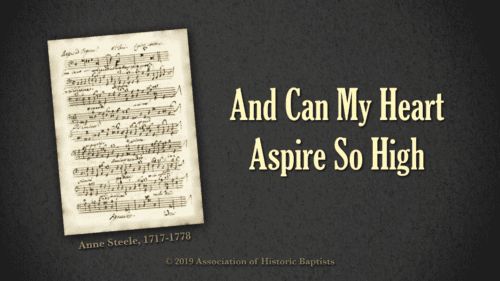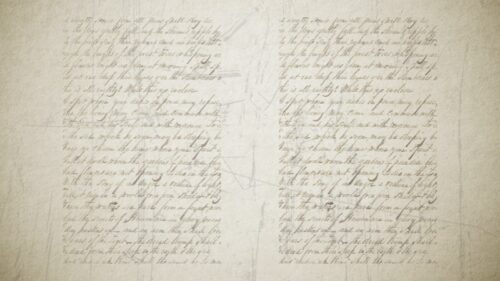
The Life And Ministry Of Anne Steele
Earthen Vessel 1907:
“Father, Whatever Of Earthly Bliss”
With Notes Of The Hymns And Its Author, Anne Steele
It has been observed that many of our most approved hymn writers were unmarried—the list including Cowper, Sir E. Denny, Charlotte Elliott, Susannah Harrison, R. Murray M’Cheyne, Samuel Pearce, Thomas Row, Jane Taylor, A. M. Toplady, Anna Letitia Waring, Dr. Watts, Henry Kirke White, and the saintly lady whose name appears above.
She was the eldest daughter of a timber merchant, who also ministered in the Baptist Chapel at Broughton, in Hampshire. Here she was born in 1716, and was a member of her father’s Church for 46 years. An early trouble shadowed her whole life and rendered her a great invalid. She was engaged to be married to a young man named Elscourt, who was drowned when bathing in an adjacent river the day before their contemplated union. This proved so severe a shock that she never recovered her former health, though she lived quietly and in retirement for many years after. As her weakness increased she was confined to her chamber, often suffering great pain, which she bore with remarkable resignation to the will of God.
During her life she published two volumes of Hymns and Poems anonymously, under the signature of “Theodosia,” which two years after her death, in 1778, were reissued with numerous additions in her own name and with a biographical introduction by Rev. Caleb Evans, D.D., the Principal of Bristol College.
She was undoubtedly a woman of superior parts, a sound and intelligent theologian, and deeply imbued with the spirit of the Gospel. Her hymns are valued not only as chaste and melodious compositions of a most evangelical character, but for their pensive spirit and the sweet acquiescence to the Divine will by which they are all pervaded. Those commencing “To our Redeemer’s glorious name,” “Father of mercies in Thy Word,” “The Saviour calls, let every ear,” “When sins and fears prevailing rise,” “Dear Refuge of my weary soul,” and “Jesus, the Spring of joys divine,” being perhaps the best known of her compositions. The last is unhappily excluded from the “Baptist Church Hymnal,” possibly because it presents so humbling a view of the “boasting reason” of natural men.
It is evident that her life of loneliness and suffering tinctured her mind with melancholy. This is apparent in many of her hymns; but these, however, are never morbid, and breathe throughout the spirit so fully expressed in the one which begins, “My God, my Father, blissful name! O, may I call Thee mine.” The third verse is wondrously sweet:—
“Whatever Thy Providence denies, O help me to resign;
For Thou art good and just and wise, O bend my will to Thine.”
When these lines are associated with the thin and wasted hand by which they must have been penned they have a pathos almost unique.
Broughton, being a small rural town without a railway station, has undergone comparatively few changes in recent years, and the chapel and manse still stand, the Church having recently celebrated its 250th anniversary.
Our friend and brother, J. T. Doggett, in a recent letter informs us that he passed a Sunday (June 23rd) at the birthplace of dear Anne Steele, the hymn writer and poetess. He stayed Saturday and Lord’s-day at the house of the esteemed minister of the chapel, Henry A. Tree, where at one time her father laboured for many years. He explored the house in which she was born, without let or hindrance, as it is at present in a dismantled state, being in the builder’s hands for thorough renovations. In the chapel library he saw her Bible with her writing in it, and other interesting souvenirs. “May the cause,” he kindly adds, “long continue to flourish!”
“Father, whate’er of earthly bliss,” is generally accepted as the opening line of her most popular hymn, and it is so given in almost all the collections in which it is to be found. The three verses with which we are familiar, however, form the close of a far longer lyric. This which we now present, in extenso, shall conclude our Paper.
Desiring Resignation And Thankfulness
No 74 In Hymns And Poems, By Anne Steele
When I survey life’s varied scene
Amid the darkest hours,
Sweet rays of comfort shine between,
And thorns are mix’d with flowers.
Lord, teach me to adore Thy hand,
From whence my comforts flow;
And let me in this desert land
A glimpse of Canaan know.
Are health and ease my happy share?
O may I bless my God;
Thy kindness let my songs declare,
And spread Thy praise abroad.
While such delightful gifts as these
Are kindly dealt to me,
Be all my hours of heath and ease
Devoted, Lord, to Thee.
In griefs and pains, Thy sacred Word
(Dear solace of my soul!)
Celestial comforts can afford,
And all their power control.
When present sufferings pain my heart,
Or future terrors rise,
And light and hope almost depart
From these dejected eyes:
Thy powerful Word supports my hope,
Sweet cordial of the mind!
And bears my fainting spirit up,
And bids me wait resign’d.
And O, whate’er of earthly bliss
Thy sovereign hand denies,
Accepted at Thy throne of grace,
Let this petition rise:
“Give me a calm, a thankful heart,
From every murmur free;
The blessings of Thy grace impart,
And let me live to Thee.
“Let the sweet hope that Thou art mine,
My path of life attend;
Thy presence through my journey shine,
And bless its happy end.”

Anne Steele
Anne Steele (1716-1778) was a poet and hymn writer. She was contemporary with John Gill, Augustus Toplady and George Whitefield. Her ancestors were numbered among the Puritans and she hailed from a long line of gospel preachers. She was the eldest daughter of a Baptist preacher named William Steele. He oversaw a congregation in Hampshire, England, where he and his family lived. At an early age, her mother died. A few years later she sustained a permanent injury to her hip after falling from a horse. After her twenty-first birthday, she was married to a Mr. Elscourt, but he died on the day of their wedding in a drowning accident. She therefore lived under her father’s care until his death, at which time she lived with her brother for the remainder of her life. After showing a gift for writing poetry, her father advised her to use a pseudonym so as not to be lifted up with pride. She therefore attributed her poems and hymns to the name “Theodocia”, which means “devoted to God”. She prepared her first selection of hymns while in her forties, on which occasion her father recorded in his diary—“Nov. 29. 1757, This day, Nanny sent part of her composition to London, to be printed. I entreat a gracious God, who enabled, and stirred her up to such a work, to direct in it and bless it for the good of many…I pray God to make it useful, and keep her humble."
"ALAS, HOW OFT, THIS WRETCHED HEART"





